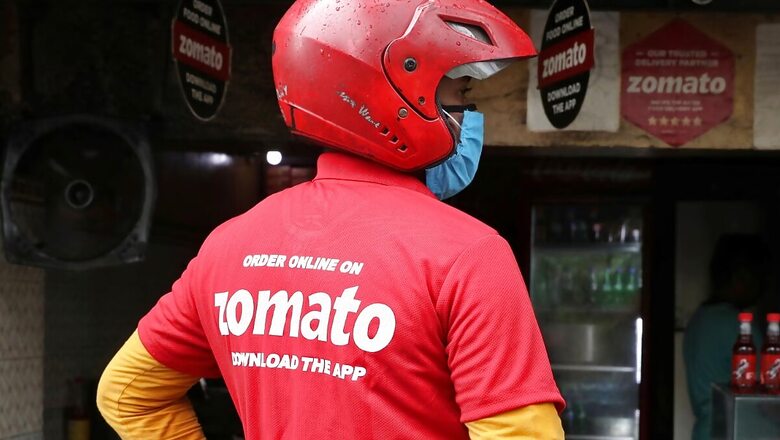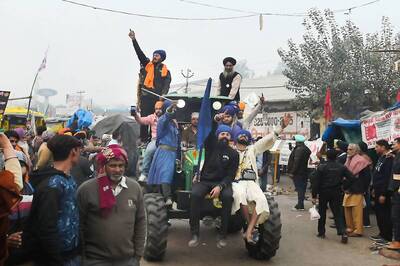
views
Meat is inflammable in India. Whether you like your steak medium-rare or you reject the killing of living creatures for food, any discussion around it is prone to catching fire instantly. Religion breathes hot and heavy on our diet, caste kindles passions on our plates.
So, when food delivery giant Zomato announced a pure-veg service in which exclusive delivery vehicles and boxes will be used for those finicky about not getting their food mixed up with non-vegetarian stuff, India’s self-proclaimed secularati pounced on the company, calling the move casteist and discriminatory. The usual bogey of Brahminism immediately came up, without an iota of irony about the casteist attack against Brahmins and the larger, thinly veiled offensive against Hindus.
This latest diatribe against Zomato is a non sequitur. It is just a special service for a category of customers. But it does not discriminate or inconvenience anybody. Zomato has not said it will stop serving food to non-vegetarians. Nor has it declared that people of any particular caste, religion or race cannot be part of the ‘pure veg’ service. For instance, your pure-veg meal could be cooked by a Dalit or a Christian and delivered to you by a Muslim executive.
The protestations appear even more devoid of logic and soaked in devious agenda because the same worthies refuse to show even a leaping eyebrow of affront over halal-marked food, which casually cuts out non-Muslims from the entire meat economics involving Muslims.
The outrage over Zomato’s pure-veg service is nonsensical. But what it also shows is that Indians are still not debating the right and pertinent issues around meat.
From ancient times, India has never been a vegetarian-majority nation and is unlikely to turn into one soon. The 2015-16 National Family Health Survey-4 found that 70 per cent of women and 78 per cent of men in India were non-vegetarians.
Jains and certain vegetarian Hindu and Buddhist sects are welcome to practice their faith safely in this land, but even Mohandas Karamchand Gandhi cannot gaslight Bharat to turn exclusively vegetarian.
So, here are the four major issues which should inform India’s debate around meat and diet.
First, respect the choices of vegetarians and vegans. Zomato or any other organisation is perfectly justified in going a step ahead to reward their compassion and concern for animals. Any cast or community is entitled to their food choice as long as they are not forcing it on others.
Why then the problem with beef, one may ask. It is because even the makers of our Constitution acknowledge the worship of the cow as a ‘mother’ or provider of milk and a host of goodness as a national and civilisational ethos. Article 48 — one of the Directive Principles — asks the state to try and ban the slaughter of cows and calves.
Second, India needs to end the halal apartheid. One has to recite from the Quran and strictly observe the Islamic slaughter ritual to make halal meat. The whole idea is to filter out non-Muslims. Since most Hindus and Sikhs today are not vociferous about meat from jhatka-style slaughter, halal gives the perfect ploy for Muslims to monopolise the meat industry, at least at the middle and lower levels. Random halal certification must end, and establishments advertising halal labels must also clearly brand non-halal or jhatka products.
Third, India must adopt slaughter methods which minimise animal pain and cruelty. There are advanced stunning technologies available for slaughter worldwide. Once the animal is stunned and unconscious, one can use their preferred religious method.
Also, there has been considerable research and development on enclosures and transportation which reduces animal stress. These methods must be made mandatory. After all, Article 48 does not stop at advising against cow slaughter. It directs governments to adopt newer technologies, and “re-organise agriculture and animal husbandry on modern and scientific lines”.
And fourth, from pain-free slaughter, Bharat must move first to slaughter-free meat. Cultured or lab-grown meat is grown in a laboratory from a few animal cells. It is real meat, but it does not require animals to be slaughtered. Scientists take stem cells from an animal. They soak the cells in a liquid containing nutrients to make them multiply. They then put them in a bioreactor to grow. The meat is then made into burgers and sausages or sold raw.
India has also seen a few startups which use plant-based material to produce meat-like products.
Some international alt-meat startups are being valued at $10 billion upwards. The in-vitro meat market in India is projected to grow from a measly $2 million to $3 billion by 2030, according to Allied Market Research data. By 2040, 60 per cent of all meat in the world is projected to be slaughter-free.
Lab meat cuts out the carbon footprint needed to raise and graze animals and the chances of antibiotic resistance and contamination. It is a great protein source. And most importantly, since no slaughter is involved, it fits into the Bharatiya ethos of not hurting the helpless and the innocent.
Difficult to see how the usual suspects would spin that as ‘casteist’ and ‘discriminatory’.
Abhijit Majumder is a senior journalist. Views expressed in the above piece are personal and solely those of the author. They do not necessarily reflect News18’s views.

















Comments
0 comment